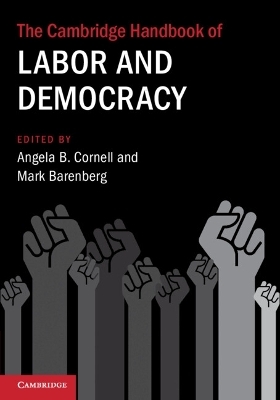
The Cambridge Handbook of Labor and Democracy
Cambridge University Press (Verlag)
9781009374705 (ISBN)
We are currently witnessing some of the greatest challenges to democratic regimes since the 1930s, with democratic institutions losing ground in numerous countries throughout the world. At the same time organized labor has been under assault worldwide, with steep declines in union density rates. In this timely handbook, scholars in law, political science, history, and sociology explore the role of organized labor and the working class in the historical construction of democracy. They analyze recent patterns of democratic erosion, examining its relationship to the political weakening of organized labor and, in several cases, the political alliances forged by workers in contexts of nationalist or populist political mobilization. The volume breaks new ground in providing cross-regional perspectives on labor and democracy in the United States, Europe, Latin America, Africa, and Asia. Beyond academia, this volume is essential reading for policymakers and practitioners concerned with the relationship between labor and democracy.
Angela B. Cornell is a Clinical Professor at Cornell Law School and founding director of the Labor Law Clinic. Her teaching, practice and scholarship focus on domestic and international labor law, and business and human rights. Her research has been published in a number of journals and her analysis has appeared in the New York Times, Economist, and Washington Post and on the BBC and NPR. Mark Barenberg is Isador and Seville Sulzbacher Professor of Law at Columbia University and Director of the Columbia Program on Labor Law and Political Economy. He has taught at the universities of Yale, Harvard, Tokyo, Beijing, Rome, Cologne, and the European University Institute.
Introduction Angela B. Cornell; Part I. Labor and Democracy: Theory and Practice: 1. A new labor law for deep democracy: from social democracy to democratic socialism Mark Barenberg; 2. Labor and democracy: constructing, deepening, and defending citizenship rights Kenneth M. Roberts; 3. Labor's obstacles and democracy's demise Angela B. Cornell; 4. Right-wing populism, illiberal democracy, trade unions, and workers' rights Keith D. Ewing; Part II. History, Politics, and Law: 5. Sectoral bargaining in the United States: historical roots of a twenty-first century renewal Nelson Lichtenstein; 6. The lever and the fulcrum: organizing and bargaining for democracy and the common good Stephen Lerner, Sarita Gupta, Lauren Jacobs, Joseph A. McCartin, and Marilyn Sneiderman; 7. 'Industrial democracy' in the United States, past and present Wilma B. Liebman; 8. Holding on: the decline of organized labor in the U.S. in historical perspective and the implications for democracy Timothy J. Minchin; 9. Unions and the democratic first amendment Charlotte Garden; Part III. Labor, Diversity, and Democracy: 10. Coming apart: how union decline and workplace disintegration imperil democracy Cynthia Estlund; 11. Unions can help white workers become more racially tolerant Paul Frymer, Jacob M. Grumbach, and Thomas Ogorzalek; 12. Attacking democracy through immigration workplace raids Bill Ong Hing; 13. The care crisis: covid-19, labor feminism, and democracy Debora Dinner; Part IV. Country and Regional Perspectives: 14. Labor, workers' rights, and democracy in Latin America Mark Anner; 15. African perspectives on labor rights as enhancers of democratic governance Evance Kalula and Chanda Chungu; 16. Why workers often oppose democracy David Ost; 17. Reclaiming democracy: the challenge facing labor in India Anibel Ferus-Comelo; 18. A critical assessment of democratic labor unionism in South Korea from a feminist standpoint Jaok Kwon; Part V. Labor and Democracy Sectoral Case Studies: Platform Workers, Higher Education, and the Care Industry: 19. Pursuing democratic depth in an age of multinational power and soft labor law: the case of platform worker protests Julia López López; 20. Corporatization of higher education: a crisis of labor and democracy Risa L. Lieberwitz; 21. The fissured welfare state: care work, democracy, and public-private governance Gabriel Winant.
| Erscheinungsdatum | 02.05.2023 |
|---|---|
| Reihe/Serie | Cambridge Law Handbooks |
| Zusatzinfo | Worked examples or Exercises |
| Verlagsort | Cambridge |
| Sprache | englisch |
| Maße | 177 x 252 mm |
| Gewicht | 720 g |
| Themenwelt | Recht / Steuern ► Arbeits- / Sozialrecht ► Arbeitsrecht |
| Recht / Steuern ► EU / Internationales Recht | |
| Sozialwissenschaften ► Politik / Verwaltung ► Vergleichende Politikwissenschaften | |
| Sozialwissenschaften ► Soziologie ► Mikrosoziologie | |
| ISBN-13 | 9781009374705 / 9781009374705 |
| Zustand | Neuware |
| Informationen gemäß Produktsicherheitsverordnung (GPSR) | |
| Haben Sie eine Frage zum Produkt? |
aus dem Bereich


